Cholesterol is a type of lipid (fat) found in your blood, essential for building healthy cells, producing hormones, and performing other vital functions. However, when cholesterol levels rise beyond normal limits, it can have serious consequences for your health. High cholesterol typically refers to an excess of low-density lipoprotein (LDL) cholesterol, often referred to as “bad” cholesterol, which can accumulate on the walls of arteries, causing a range of health problems.
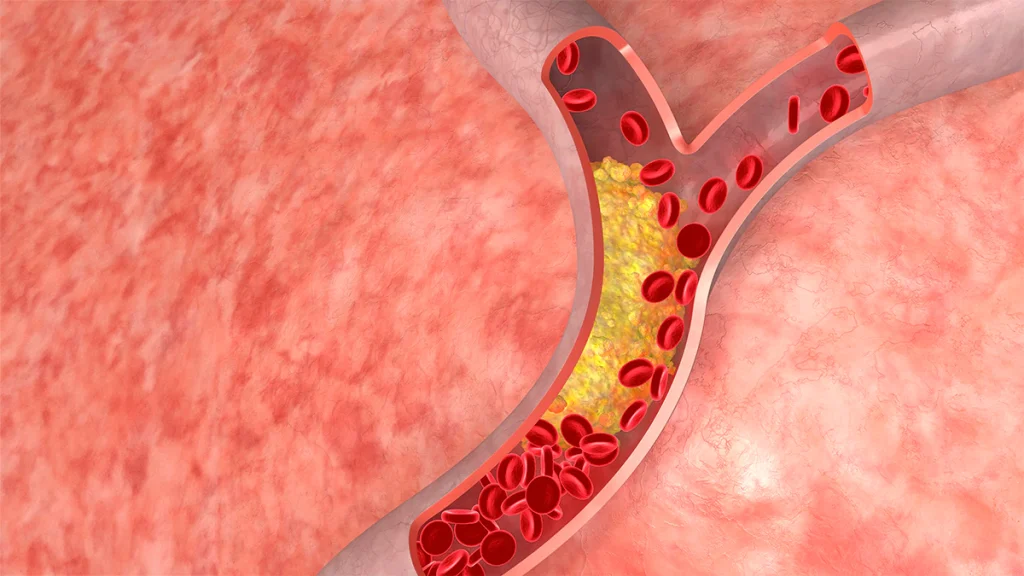
Understanding Cholesterol
Before discussing the consequences of high cholesterol, it’s essential to understand what cholesterol is and how it functions in the body.
There are two main types of cholesterol:
LDL (Low-Density Lipoprotein)
Often called bad cholesterol, LDL can build up in the walls of arteries, narrowing and hardening them. This process is called atherosclerosis, which can lead to heart disease and other cardiovascular problems.
HDL (High-Density Lipoprotein)
Known as good cholesterol, HDL helps remove LDL cholesterol from the bloodstream by carrying it to the liver, where it’s processed and eliminated. Higher levels of HDL cholesterol are beneficial as they protect the heart and blood vessels.
When cholesterol levels are balanced, the body functions optimally. But an excess of LDL cholesterol or a lack of HDL cholesterol can lead to severe health issues.
Learn more What is lipoprotein (La) how does it impact the heart? By clicking here know some interesting facts.
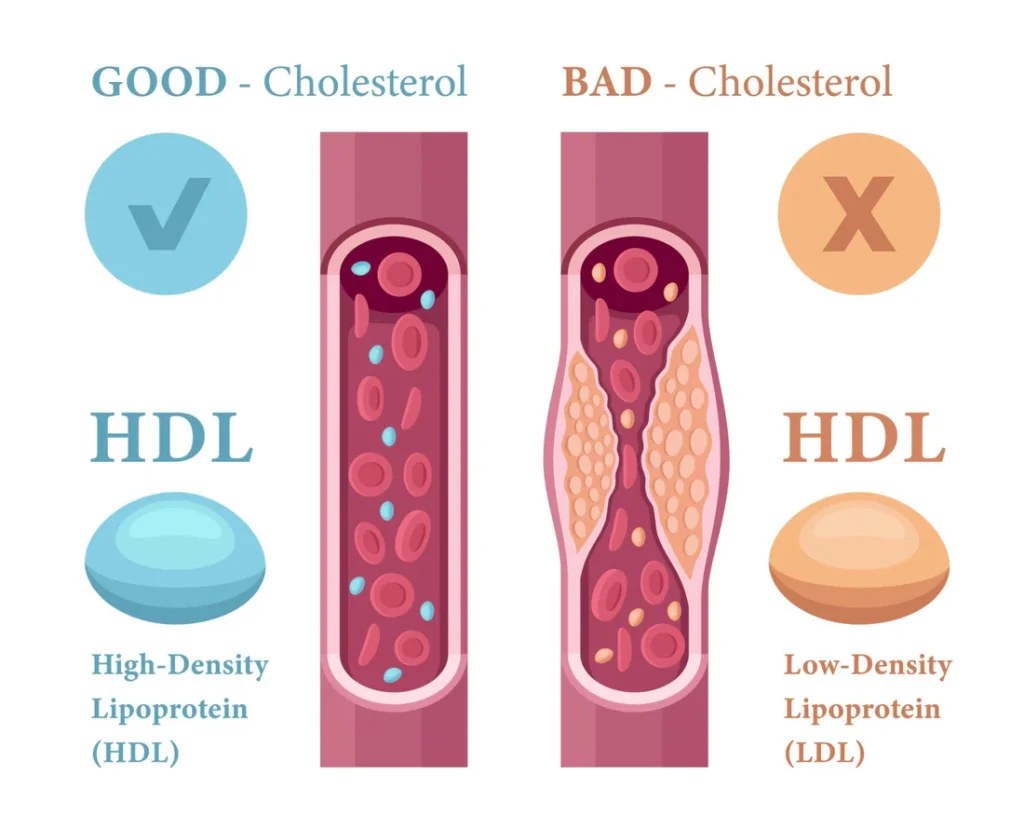
What Happens When Cholesterol is High?
1. Aterosclerosis
High LDL cholesterol levels can cause fatty deposits to build up inside the blood vessels, narrowing and stiffening them over time. This condition is known as atherosclerosis. The hardened arteries make it difficult for blood to flow freely to vital organs, leading to reduced oxygen and nutrient delivery.
As the arteries continue to narrow, the risk of blood clots increases, which can obstruct the flow of blood entirely, resulting in heart attacks or strokes.
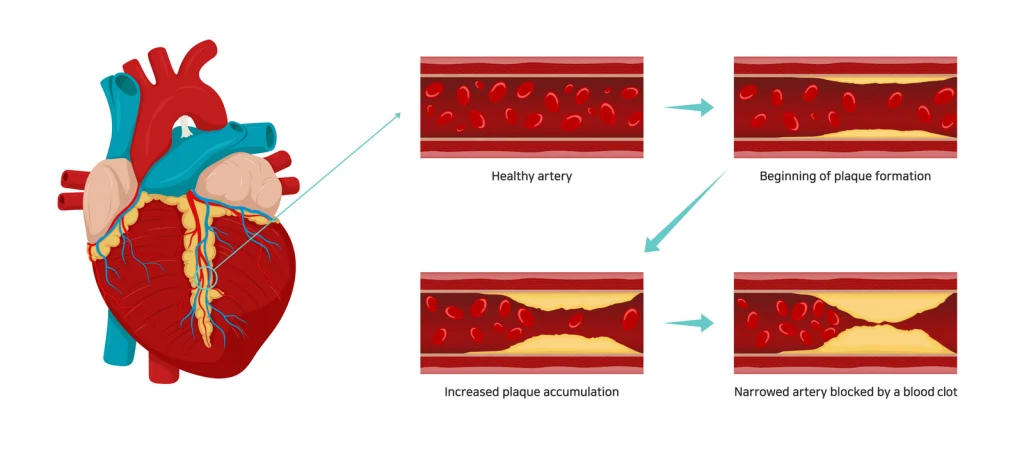
2. Coronary Artery Disease (CAD)
One of the most serious effects of high cholesterol is the development of coronary artery disease (CAD). This condition occurs when the coronary arteries, which supply oxygen-rich blood to the heart, become narrowed or blocked due to the accumulation of fatty plaques. As the plaques grow larger, the blood flow to the heart decreases, causing chest pain (angina) or heart attacks.
CAD is a leading cause of death worldwide and can be prevented by managing cholesterol levels through diet, exercise, and, in some cases, medication.
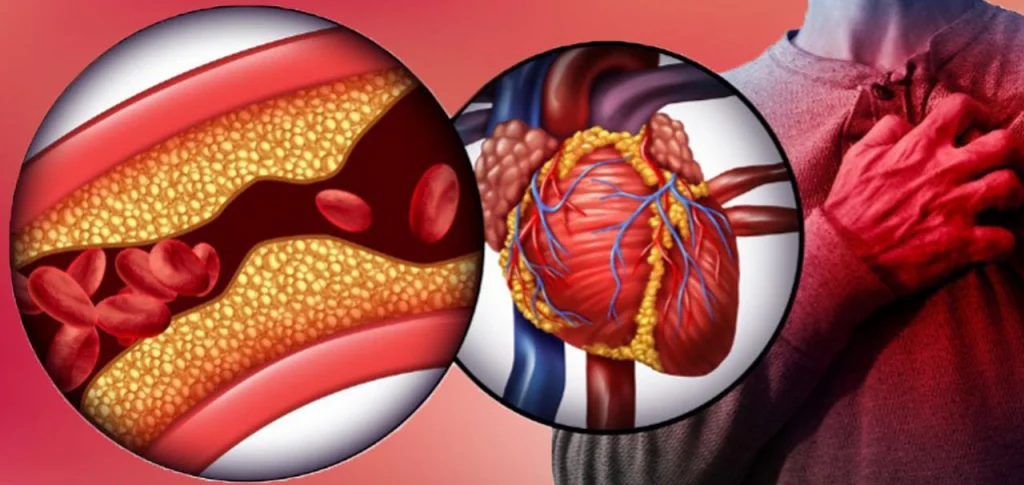
3. Stroke
A stroke occurs when there is a sudden disruption in the blood supply to the brain. High cholesterol levels, particularly high LDL cholesterol, contribute to the formation of blood clots, which can travel to the brain and block a blood vessel. This blockage can cause irreversible brain damage and loss of function, depending on the severity of the stroke. High cholesterol increases the risk of both ischemic strokes (caused by blockages) and hemorrhagic strokes (caused by ruptured blood vessels).
4. Peripheral Artery Disease (PAD)
High cholesterol can also affect arteries outside of the heart and brain, leading to peripheral artery disease (PAD). PAD occurs when the blood vessels in the legs and arms become narrowed or blocked due to plaque buildup. As a result, the affected limbs may experience pain, cramping, numbness, or weakness, especially when walking or exercising. In severe cases, PAD can lead to limb amputation.
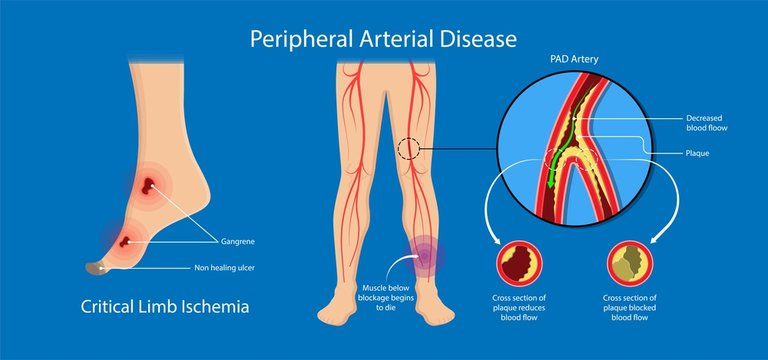
5. Hypertension (High Blood Pressure)
When cholesterol builds up in the arteries, it makes the vessels stiffer and narrower. This increased resistance to blood flow forces the heart to work harder to pump blood throughout the body, raising blood pressure. High cholesterol and high blood pressure often go hand in hand, and the combination significantly increases the risk of heart disease and stroke.
6. Gallstones
The liver produces cholesterol, which is used to make bile, a substance that helps digest fats. When there is an excess of cholesterol in the bloodstream, some of it may become solidified in the form of gallstones. These stones can develop in the gallbladder and block the flow of bile, causing intense pain, nausea, and other digestive issues. If left untreated, gallstones may require surgical removal.
7. Kidney Disease
High cholesterol is also associated with kidney disease, particularly in individuals who have high blood pressure or diabetes. The buildup of cholesterol in the blood vessels can reduce blood flow to the kidneys, causing them to function poorly. Over time, this can lead to kidney failure, requiring dialysis or even a kidney transplant in severe cases.
8. Increased Risk of Diabetes
Although cholesterol and diabetes are not directly related, there is a connection between high cholesterol and the development of type 2 diabetes. High cholesterol, particularly high LDL and low HDL, can increase insulin resistance in the body. This means the body’s cells become less responsive to insulin, leading to higher blood sugar levels, which is a hallmark of type 2 diabetes.
Risk Factors for High Cholesterol
Several factors can contribute to high cholesterol levels, including:
Poor Diet: Diets high in saturated fats, trans fats, and cholesterol can raise LDL cholesterol levels. Processed foods, red meats, and fried foods are common culprits.
Physical Inactivity: Lack of exercise can reduce HDL cholesterol levels, while increasing the risk of obesity and high LDL cholesterol.
Obesity: Being overweight or obese can increase cholesterol levels, particularly by raising LDL and lowering HDL.
Smoking: Smoking damages the walls of blood vessels, making it easier for LDL cholesterol to accumulate and form plaques. It also lowers HDL cholesterol.
Genetics: Inherited conditions, such as familial hypercholesterolemia, can cause high cholesterol levels regardless of diet or lifestyle.
Age and Gender: Cholesterol levels naturally increase with age. Before the age of 50, men are at a higher risk of high cholesterol, but women’s cholesterol levels rise after menopause.
How to Control High Cholesterol
The good news is that high cholesterol can often be managed with lifestyle changes and, if necessary, medications.
1. Healthy Diet
Eating a heart-healthy diet is one of the most effective ways to lower cholesterol. Focus on:
- Reducing saturated and trans fats.
- Increasing fiber intake by eating fruits, vegetables, and whole grains.
- Choosing lean protein sources such as fish, poultry, and legumes.
Do You Know
2. Regular Exercise
Physical activity helps raise HDL cholesterol and lower LDL cholesterol. Aim for at least 30 minutes of moderate exercise, such as brisk walking, cycling, or swimming, on most days of the week.
More
Do you know how exercise will impact your body and boost your metabolism? Click here and learn some facts.
3. Medications
In some cases, lifestyle changes may not be enough to manage high cholesterol. Statins and other medications, such as bile acid sequestrants, cholesterol absorption inhibitors, or PCSK9 inhibitors, may be prescribed by a healthcare provider to help control cholesterol levels.
4. Quit Smoking
Quitting smoking improves your HDL cholesterol levels and reduces your risk of heart disease and stroke.
Conclusion
High cholesterol is a serious condition that can lead to a variety of cardiovascular and other health problems if left untreated. By understanding the risks associated with high cholesterol and taking proactive steps to manage it—through diet, exercise, and medication—you can significantly reduce your risk of heart disease, stroke, and other complications. Regular check-ups with your healthcare provider are essential for monitoring cholesterol levels and ensuring optimal heart health.
FAQs
1. What causes high cholesterol?
High cholesterol is caused by a poor diet, lack of exercise, obesity, smoking, and genetic factors. Medical conditions like diabetes and thyroid problems can also contribute.
2. How can I lower my cholesterol naturally?
Eat a heart-healthy diet, exercise regularly, quit smoking, and limit alcohol intake to naturally lower cholesterol.
3. What are the symptoms of high cholesterol?
High cholesterol typically has no symptoms, making regular check-ups important for detection.
4. At what level is cholesterol considered too high?
Total cholesterol over 200 mg/dL, LDL over 100 mg/dL, and triglycerides over 150 mg/dL are considered high and increase health risks.
5. Can medication help lower my cholesterol?
Yes, medications like statins and PCSK9 inhibitors can help lower cholesterol if lifestyle changes aren’t enough.